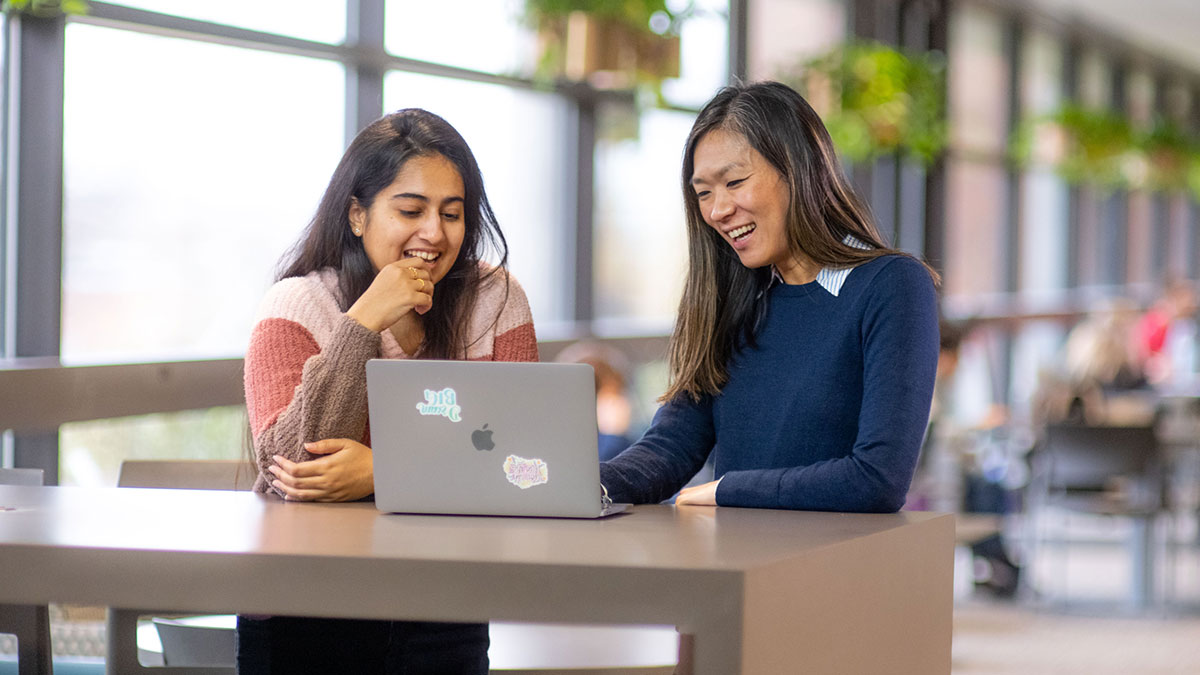International Students

International Students
- RIT/
- Career Services and Co-op/
- Students/
- International Students
International students may encounter more of a challenge in securing co-op or full-time jobs than most U.S./full-time residents. We’ll help you learn more about documentation, visas and permits, and U.S. Citizenship and Immigration Services policies.
Job Search
Many employers use the co-op program to transition students into a full-time role post-graduation. In order to outshine your U.S. competition, your qualifications need to be far superior. It’s recommended that international students meet with their career services coordinator two semesters before they intend to co-op or graduate for the best outcome.
Please noted that jobs with the federal government require U.S. citizenship. Employers that have contracts with the government also require U.S. citizenship, with little flexibility to hire permanent residents.
Interstride
Interstride is a one-stop shop that empowers students to thrive internationally. Access immigration information, current news articles, webinars, search for jobs and co-ops, and network with fellow international students and alumni.
Documentation
In order to work in the United States, you must have a social security number and card. Find applications at the ISS Office and/or go to the Social Security Office in Rochester. The process takes two to six weeks to complete.
You will need:
- Passport
- I-94
- I-20 or IAP-66
- A letter from an international student advisor
Social Security Office
100 State St
Rochester, NY 14614
All international students need to have written authorization before starting off-campus work.
Written authorization can be from either:
- An international student advisor
- U.S. Citizenship and Immigration Services
Starting work without authorization violates your immigration status and you will not be to apply for reinstatement of status from within the United States.
Practical Training
According to the regulations of the U.S. Citizenship and Immigration Services agency for students with F-1 status, all work-related, educational experience requires either “curricular practical training” or “optional practical training” employment authorization.
Curricular Practical Training (CPT) must be in your field of study and an integral part of an established curriculum. This may be mandatory or optional co-op, internship, or practicum. To be eligible for CPT, you must have F-1 status and have completed at least two terms of full-time study in the U.S.
As soon as an offer of employment is accepted, but at least one week before employment begins:
- Report your co-op
- Register for co-op through your academic department
- Make an appointment to see your international student advisor to obtain work authorization. Bring your I-20 and offer of employment to the appointment.
You may be authorized for whatever amount of CPT your degree requires. However, if you have been authorized for more than 364 days, you will be ineligible for Optional Practical Training (OPT). If you have any questions, please contact your Career Services Coordinator for more information.
To be eligible for Optional Practical Training (OPT), you must obtain employment in your field of study, have F-1 status, and have completed at least one academic year (9 months) of full-time study in the U.S. A total of 12 months of OPT is allowed for F-1 students.
OPT can occur:
- Part-time during the academic year
- After completion of all course work
- Before completion of a thesis or project for graduate students
- After completing your degree
In the case of certain STEM majors (science, technology, engineering, and math), students may also be eligible to extend their OPT for an additional 24 months.
Meet with your International Student Advisor to complete the necessary forms and obtain the necessary recommendation. Apply to the U.S. Citizenship & Immigration Services for the specific time of employment.
For students holding J-1 Visas, regulations for off-campus employment differ from those with F-1 status. Students on J-1 Visas must have written authorization to work off-campus.
Some students holding J-1 visas might qualify to work under academic training for up to 18 months, or the duration of their academic program, whichever is shorter. Meet with your International Student Advisor to obtain information on authorization for co-op or work authorization/academic training after graduation.
Work after Graduation
If you plan to stay in the U.S. after graduation on a temporary or permanent basis, you will want to obtain a temporary working permit (H-1B). Immigration law refers to H-1B workers in “specialty occupations.” Specialty occupations include most jobs for which a bachelor’s or master’s degree in a specific field is necessary for employment. For example, someone receiving a master’s in computer engineering could obtain an H-1B for a role as a software engineer.
In order to obtain H-1B status, you must first have an offer of employment. There are then specific steps, which the employer must take. You may be in H-1B status for up to six years.
International Student Services
For more information regarding U.S. Citizenship and Immigration Services policies on employment, federal and state taxes, obtaining a social security number, and special co-op employment needs of international students, consult with International Student Services
Recruit International Students
Globalization and improving diversity inclusion in the workplace are some of the initiatives employers are tackling in the upcoming years. Be one step ahead of this growing work trend by hiring international students from RIT.
If you are interested in hiring international RIT students, contact Julian Huenerfauth, Assistant Director for International Student Career Services, at pjhoce@rit.edu.
International students offer employers:
- Adaptability to work within a diverse, unknown workplace
- Tenacity to see a project through to completion and its success
- Capability to provide a new, multicultural perspective that will contribute to the team
Federal regulations permit the employment, or practical training, of international students on F-1 (foreign student) and J-1 (exchange visitor student) visas within certain limits. Students in these statuses may work off-campus after completing one academic year of full-time study and obtaining the proper authorization from their school or U.S. Citizenship and Immigration Services (USCIS).
USCIS defines practical training as employment related to the student’s course of study.
CPT authorization allows students to participate in co-op, internship, and other experiential learning opportunities. Provided by RIT’s International Student Services, the organization will provide the student with a new SEVIS I-20 that employers use along with the student’s passport as verification documents for the I-9.
Students may work on co-op for whatever period of time their academic programs designate. This can be as short as one term and as long as five terms.
OPT authorization allows students to participate in part-time and full-time work. Provided by USCIS, the organization will issue an Employment Authorization Document (EAD) that a student will use with their passport for I-9 verification.
Students may work part time during the academic year or full time during vacation, after completion of coursework, and after graduation.
Students graduating with degrees that have a STEM designation (Science, Technology, Engineering, or Mathematics) are eligible for an extension of their OPT period for two extra years. Employers wishing to hire students for the STEM OPT period must participate in E-Verify.
Students on J-1 visas have somewhat different regulations regarding the length of their visas, the conditions under which they can work, and what they may do on completion of their visas. Students on J-1 visas must have written permission from their program sponsor (the university or agency that wrote their DS-2019 form) to engage in any type of employment but do not need to obtain an EAD card from USCIS.
Students can engage in up to a total of 18 months of academic training during their studies and after they graduate.
Many international students are hired after completing their studies for long-term employment in the United States. A student who has completed the minimum of a bachelor’s degree and is entering professional level employment is eligible for an H-1B (temporary worker) visa. This will allow the graduate to work in the United States for six years.
Employers can simply make an offer of employment to the student and do not have to take additional steps within their organization. Employers should note that each period of employment must be authorized and that students who return to the same employer for several co-op positions must be reauthorized for each one.
Paperwork is handled by the student and RIT’s International Student Services. Students are instructed to bring the proper verification documents to the employer personnel office when they begin their employment.





